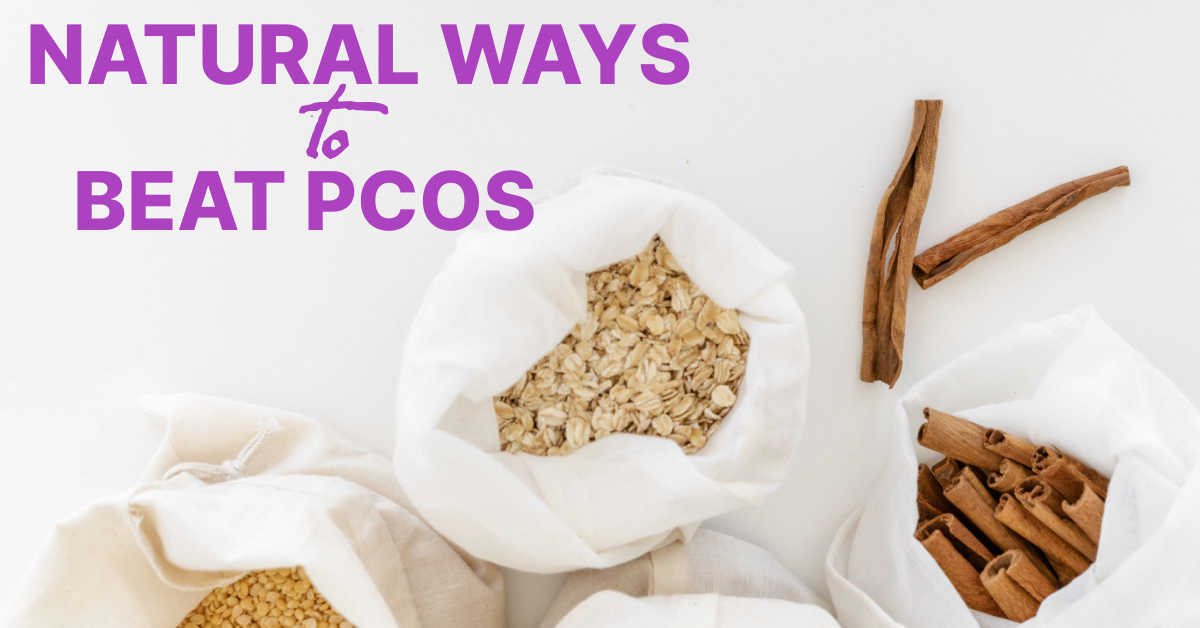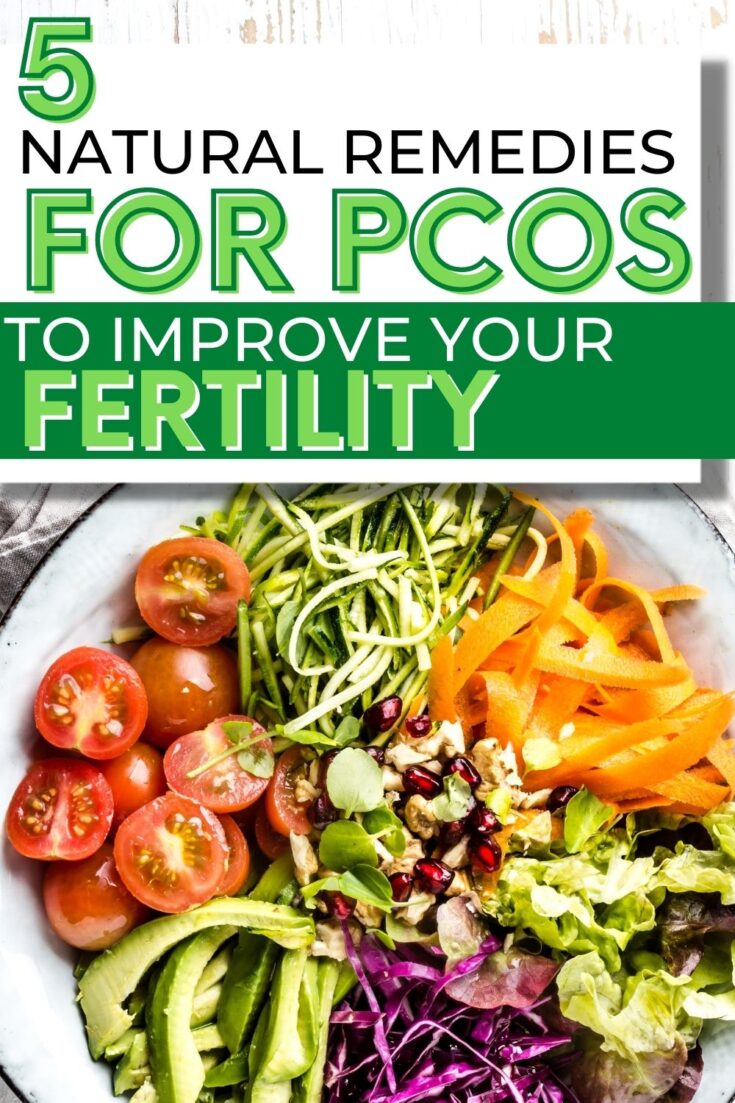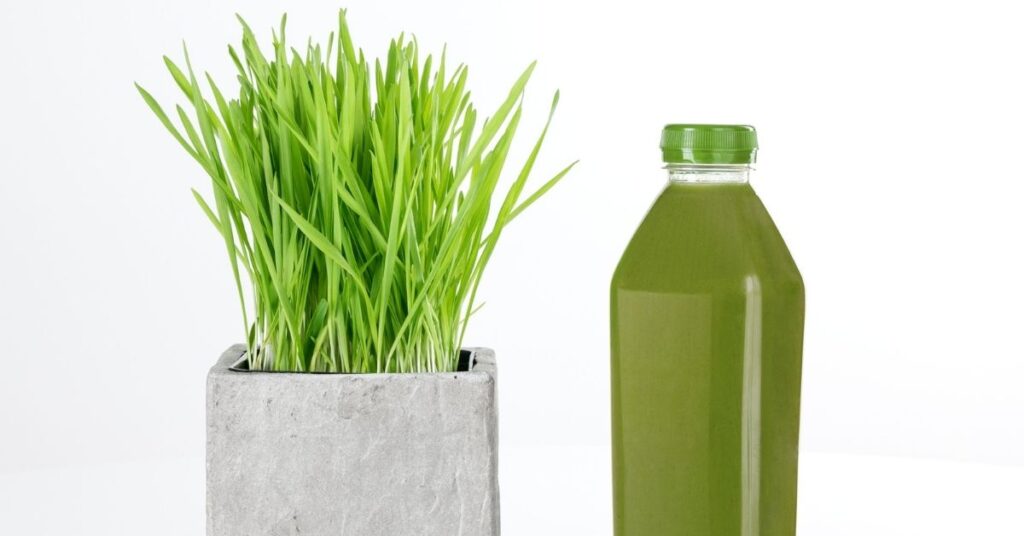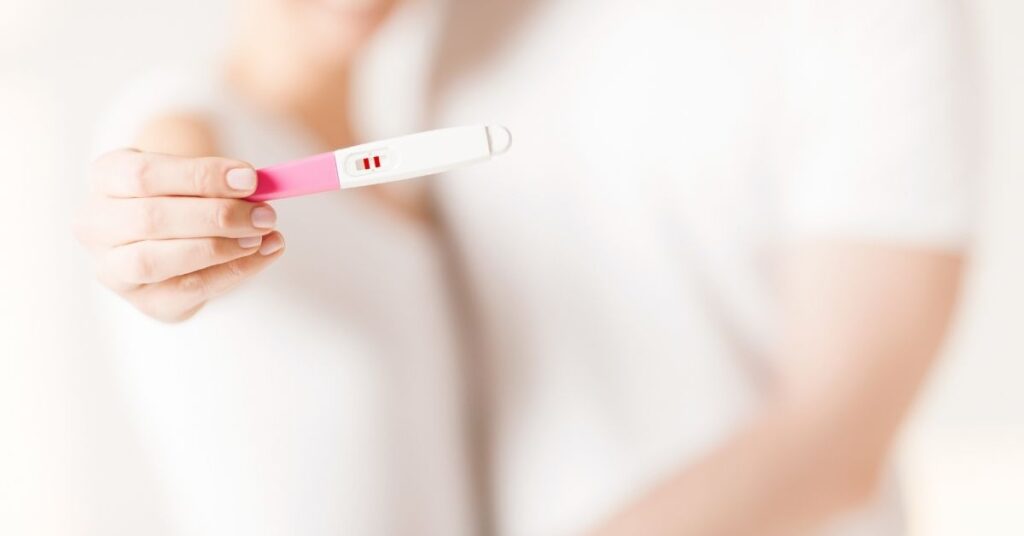5 Natural Ways To Help PCOS You Need To Try
If you are one of the almost 5 million women in the USA that has been diagnosed with polycystic ovarian syndrome, you will be glad to know that there are natural remedies for PCOS to try that can make a huge difference to your health.
This guest post from Dana at Natural Earthy Mama will show you exactly what you can do to improve your PCOS today.
Read on for all the details and to grab your free ebook with a PCOS food list and meal plan.

This page contains affiliate links meaning I earn a commission if you use those links. Please read my Disclosure for more information.
Polycystic ovarian syndrome (PCOS) affects about 10-20% of the women in the western world. Modern medicine has no cure for PCOS and many women are left with no treatment options.
There are, however some natural ways to manage PCOS that will give most women effective results with their symptoms and improve your chances of getting pregnant.
What is PCOS?
Polycystic ovarian syndrome is a chronic long term condition that appears to be caused by a combination of factors.
There is a strong genetic component as well as a link to insulin resistance which is made worse by eating a modern-day high-carbohydrate based diet.
Symptoms of PCOS include:
- Overweight
- Belly fat
- Hirsutism (facial hair)
- Balding
- Insulin resistance
- Irregular or no ovulation
- Irregular or no periods
- Cysts on the ovaries
- Infertility
Many women with PCOS suffer from poor egg quality which means that even if they produce a lot of eggs, they are not strong enough to be fertilized.
If you want to learn how to improve your egg quality naturally, make sure to download this free ebook.
Natural Ways To Help PCOS That Can Improve Fertility
While there are several things you can do to naturally boost your fertility, here are 5 simple changes you can make to your lifestyle to help to get your PCOS under control.
1. Exercise Properly
Insulin resistance is at the root of PCOS.
One of the most effective ways to combat insulin resistance in the long term is building muscle. In the short term, exercise like gentle cardio (walking, swimming, bike riding) will reduce your blood glucose and improve your glucose tolerance (insulin resistance).
Weight lifting and resistance exercises are the most effective option for reducing insulin resistance in the medium to long term.
However, if you’re new to exercise, getting fit can offer a world of benefits outside of fertility. You’ll lower your blood pressure and blood glucose/insulin levels, as well as help manage your weight.
You might even reap some bonus benefits, such as better sleep and more energy.
The key is to start slow, keep exercising and listen to your body. Results from exercise can take time, so don’t overwork your body.
If you are overweight, try something like yoga to start with, combined with gentle walking and slowly build up your tolerance.
2. Adopt a Ketogenic or Low Carbohydrate, High Fat Diet
The fundamental essence of the Keto Diet (also known as LCHF) is the obvious lack of sugar and carbohydrates that your body converts to glucose (sugar).
Basically, a ketogenic diet significantly restricts carbohydrates, while focusing heavily on high fats (healthy fats) and moderate protein. For ideas of what you can and can’t eat on a keto diet, I’ve written this comprehensive guide.
The upshot to this is your body will learn how to burn fat as its main fuel source, not glucose.
By lowering your blood glucose levels and maintaining them at a steady level, your insulin levels will drop. Eventually (after 3-12 months) the cells will start to become insulin sensitive again, making a clear path for the insulin to deliver the glucose in to the cells normally again.
One study conducted with women with PCOS who followed a LCHF diet for 6 months found significantly reduced testosterone, fasting insulin and improved LH/ FSH ratio. The women also lost about 12% of their body weight over the 6 months.
You will probably find your cycles become more regular, and you have less trouble with acne too.
Click here for more information about using a Ketogenic diet to treat PCOS: Is The Keto Diet Good For Fertility?
READ NOW:The PCOS Diet {PCOS Food List And Meal Plan}
3. Take Myo-inositol Regularly
Inositol the name for a family of nine naturally occurring, B group vitamin-like compounds that play a vital role in how all our cells function. Women with PCOS have low levels of inositol in their bodies.
Myo-inositol is the type of inositol that has been shown to have the best results in treating PCOS symptoms.
There have been promising several studies done using 2000 mg of myo-inositol plus 200 μg of folic acid taken twice daily for at least 3 months.
Myo-inositol has been shown to:
- Reduce AMH levels and the size of polycystic ovaries better than birth control
- Increase egg quality
- Reduce facial hair
- Reduce the risk of ovarian hyper stimulation syndrome in women undergoing ovulation induction as part of an IVF cycle
- Have a significant impact on the hormonal parameters of PCOS patients.
- Improve glucose/insulin ratios.
- Reduce sugar cravings
- Improve cholesterol levels: HDL increased, while LDL decreased.

Importantly, studies have shown that myo-inositol increases pregnancy rates. One study showed that of women with PCOS who myo-inositol + folic acid during IVF, 32% of women got pregnant vs 12% of women who took only folic acid supplements.
Ideally you will be taking 2000mg twice per day, and it does seem to work best when taken along side a folic acid supplement once per day. You can learn more about the benefits of inositol and fertility here.
4. De-stress
A body under constant stress ends up with raised cortisol and eventually, adrenal fatigue. In this state, none of your hormones will work correctly.
Chronic stress states also raises your level of inflammation, which makes the symptoms of PCOS so much more obvious.
If you are having trouble with stress due to infertility, make sure to read my post on How To Relax While Trying To Get Pregnant – it includes a free “calm your mind” journal.
Cortisol decreases the monthly surge of luteinizing hormone (LH) which is responsible for triggering ovulation.
It is also made from the same precursor as progesterone, one of the major female reproductive hormones.
When we’re under stress, our bodies can have a hard time keeping up with the demand for cortisol. To make up for the shortfall, our body will begin to steal this hormone away from the progesterone production line and shunt it into making more cortisol.
Stress also increases insulin resistance which in turn further disrupts sex-hormone balance and causes weight gain and inflammation.
Some effective ways to reduce stress in your life are:
- Exercise – regular gentle exercise lowers cortisol and raises endorphins (happy hormones)
- Sleep– Go to bed at a sensible time each night
- Talk it out – to a friend, partner or professional
- Keep a journal – write in it before sleep each night to clear your mind to allow you to sleep well
- Meditate or take up yoga or tai chi – the only way science has found to swap your body from a flight/fight/freeze state to a rest/relax/digest state is to extend your out-breath. Meditation, yoga and tai chi all focus on the breath.
RELATED: The best fertility yoga poses to help you get pregnant
5. Take Some Herbal Supplements
There are some herbal supplements that have been shown time and again to help with PCOS. I recommended that you work with a registered naturopath to work out a program for you.
Common herbs for PCOS include:
- Vitex (chasteberry)
- Tribulus terrestris (puncture vine)
- Saw Palmetto
- White Peony
- Licorice
PCOS doesn’t have to be a life long sentence, there are natural things that you can do to help get it under control.
Want more advice on how to deal with PCOS?
Check out my free PCOS foods and meal planner ebook. Just fill out the form below to get your instant download.
FREE Fertility Resources (Ebooks, Checklists and more)
Click the links to instantly download the following useful resources, at no cost!
FREE Ebook: How to Improve Your Egg Health
FREE Report: How To Improve Sperm Health
Report: Preventing Miscarriages
FREE Ebook: Restore Fertility & Get Pregnant Naturally
Free Checklist for IVF
About the author
Dana is a homesteading, homeschooling mama of 3. Her background is in mother and baby community nursing and she has a passion for helping mamas.
She is super savvy in all things natural fertility and natural health and loves to share it in a way that people can understand.
Dana blogs over at Natural Earthy Mama and you can follow her on facebook and pinterest.
What To Read Next
The Fertility Diet That Changed My Life
10 Easy Ways To Naturally Boost Your Fertility
Is The Keto Diet Good For Fertility?
The Best Fertility Vitamins & Supplements To Help You Get Pregnant








I’ve been taking fertilemd supplement for three months. For the first time in years, I actually have a regular cycle.And my PCOS Symptoms have disappeared. My weight is losing and my facial skin is much better. Not pregnant yet, but I have confidence.